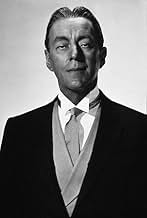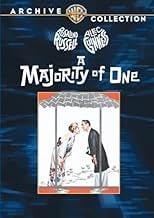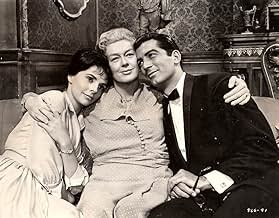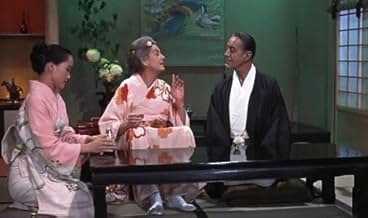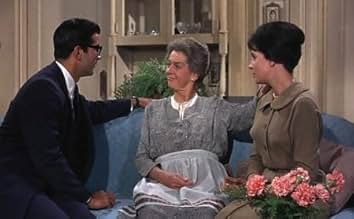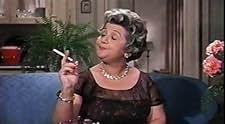ÉVALUATION IMDb
6,7/10
1,3 k
MA NOTE
Ajouter une intrigue dans votre langueA gentle love story about a Japanese businessman and widower, and a Brooklyn widow. But before a happy ending can ensue, they must learn again the lessons of tolerance, kindness, and forgive... Tout lireA gentle love story about a Japanese businessman and widower, and a Brooklyn widow. But before a happy ending can ensue, they must learn again the lessons of tolerance, kindness, and forgiveness.A gentle love story about a Japanese businessman and widower, and a Brooklyn widow. But before a happy ending can ensue, they must learn again the lessons of tolerance, kindness, and forgiveness.
- Nommé pour 1 oscar
- 3 victoires et 4 nominations au total
Mae Questel
- Essie Rubin
- (as Mae Questal)
Harriet E. MacGibbon
- Lily Putnam
- (as Harriet MacGibbon)
Lillian Adams
- Mrs. Stein
- (uncredited)
Leon Alton
- Ship Passenger
- (uncredited)
Monya Andre
- Ship Passenger
- (uncredited)
Mary Chan
- Spectator at Disembarkation
- (uncredited)
Spencer Chan
- Ship Passenger
- (uncredited)
Avis en vedette
Of course the producers needed some names to carry this, and after all, Guinness could play anything, right? Here we have Sir Alec in a variation on his standard Refined Exotic Man, very similar to his Prince Faisal in Lawrence of Arabia and Brahmin Professor Godbole from A Passage to India. On Broadway Mr. Asano was played by Cedric Hardwicke, so this was simply continuing established --and highly outdated-- practice.
At least the onstage Mrs. Jacoby was portrayed by Gertrude Berg, creator and star of TV's The Goldbergs (1949-1957), and the kind of little round Jewish mama one would visualize in the role. Roz does her best, but it's not just that she's doing Jew-Face to Guinness' Yellowface-- she comes across as gawky and vulgar rather than sweet and endearingly quaint.
As has been presented in innumerable interracial romances intended for white audiences, the potential shock is taken out by the knowledge that hey, after all, those actors are both white. Acting is pretending! Nowadays, however, audiences are more sophisticated and like a bit more realism.
Now, who would we cast in a new production of A Majority of One?
At least the onstage Mrs. Jacoby was portrayed by Gertrude Berg, creator and star of TV's The Goldbergs (1949-1957), and the kind of little round Jewish mama one would visualize in the role. Roz does her best, but it's not just that she's doing Jew-Face to Guinness' Yellowface-- she comes across as gawky and vulgar rather than sweet and endearingly quaint.
As has been presented in innumerable interracial romances intended for white audiences, the potential shock is taken out by the knowledge that hey, after all, those actors are both white. Acting is pretending! Nowadays, however, audiences are more sophisticated and like a bit more realism.
Now, who would we cast in a new production of A Majority of One?
10mmallon4
I've never seen another love story like A Majority of One. A story of two elderly individuals who are worlds apart having to overcome their racial prejudice, as well as being one of the few films in existence about love at old age. These imperfect and flawed characters feel so real and human, and while two and a half hours may seem overlong, I believe this time is justified. I wish more films could have the level of honest storytelling on display here.
The casting as Alec Guinness as a Japanese businessman has been widely criticised but I have disagree, I thought he was perfectly convincing in the role. His character is flawed, he's not the stereotypical wise old Asian man who is full of otherworldly knowledge which he easily could have been; he makes mistakes and doesn't have the answers to everything. Unlike many Asian characters in Hollywood films, he doesn't talk in broken English or exhibit any other commonly seen Asian stereotypes. Compared to Japanese stereotypes seen in World War II propaganda films 20 years earlier, A Majority of One was certainly a sign of progress.
Why should an actor's race limit the roles they can portray? If they play a character of a different race convincingly and in a non- offence manner, I don't see any reason to be up in arms. Should the roles an actor may want to attempt be limited to only characters of their race? I feel there is a double standard at play here; for a non white actor to be cast in a role or as a character originally conceived as white it will be viewed as forward thinking and progressive; for a white actor to be cast in a non white role then it is considered racist? Film is a business and you need big stars for a movie to be box office hit; how many Asian actors where big stars to American audiences in the early 60's. A movie like A Majority of One was an initial stepping stone to more equal representation in film, perhaps it not succeed as the film was not a box office success but the intent was there.
Rosalind Russell plays a potentially unlikable bigoted character but she manages to make the role endearing with her lovable nature and witty comebacks. I didn't see her character as an exaggerated stereotype. I've seen far more exaggerated representations of Jews in other films (do I even need to list examples?). Her character has lead an ingrown life in Brooklyn, however the movie shows the younger generation of her daughter and son in law holding more progressive views and are less conservative than their elders. Russell won't enter a bedroom wither son in law inhabiting without permission in case he isn't decent; her daughter on the other hand will just walk on in. Likewise the film highlights westernised trends in Japan such as Alec Guinness wearing a western flat cap tot the popularity of American music and Hollywood movies in Japan, while still acknowledging the anti American sentiment which exists in Japan. Also this movie has Eddie, a whiny little brat but in a funny way; I love this guy.
The casting as Alec Guinness as a Japanese businessman has been widely criticised but I have disagree, I thought he was perfectly convincing in the role. His character is flawed, he's not the stereotypical wise old Asian man who is full of otherworldly knowledge which he easily could have been; he makes mistakes and doesn't have the answers to everything. Unlike many Asian characters in Hollywood films, he doesn't talk in broken English or exhibit any other commonly seen Asian stereotypes. Compared to Japanese stereotypes seen in World War II propaganda films 20 years earlier, A Majority of One was certainly a sign of progress.
Why should an actor's race limit the roles they can portray? If they play a character of a different race convincingly and in a non- offence manner, I don't see any reason to be up in arms. Should the roles an actor may want to attempt be limited to only characters of their race? I feel there is a double standard at play here; for a non white actor to be cast in a role or as a character originally conceived as white it will be viewed as forward thinking and progressive; for a white actor to be cast in a non white role then it is considered racist? Film is a business and you need big stars for a movie to be box office hit; how many Asian actors where big stars to American audiences in the early 60's. A movie like A Majority of One was an initial stepping stone to more equal representation in film, perhaps it not succeed as the film was not a box office success but the intent was there.
Rosalind Russell plays a potentially unlikable bigoted character but she manages to make the role endearing with her lovable nature and witty comebacks. I didn't see her character as an exaggerated stereotype. I've seen far more exaggerated representations of Jews in other films (do I even need to list examples?). Her character has lead an ingrown life in Brooklyn, however the movie shows the younger generation of her daughter and son in law holding more progressive views and are less conservative than their elders. Russell won't enter a bedroom wither son in law inhabiting without permission in case he isn't decent; her daughter on the other hand will just walk on in. Likewise the film highlights westernised trends in Japan such as Alec Guinness wearing a western flat cap tot the popularity of American music and Hollywood movies in Japan, while still acknowledging the anti American sentiment which exists in Japan. Also this movie has Eddie, a whiny little brat but in a funny way; I love this guy.
This is a gentle little film that may have it's faults with the hindsight of 40 years, but is enjoyable, especially I feel to those that remember the post WW11 days.
Alec Guinness plays the part beautifully, with his usual master of the character, Rosalind Russel plays a good stereotyped Jewish Mother .... the other characters just fill in between the lines. The only character that I find fault with is 'Eddy' the No. 1 boy of the family in Tokyo. He is obnoxious and completely out of character with a real 'House Boy' of the times that was lucky enough to get a 'cushy number' working for an American Diplomat.
In these days of virtual reality with sex, blood and car chases being the three main criteria of movie making, this movie is like going to a stage production from the 50's...... gentle and enjoyable.
Alec Guinness plays the part beautifully, with his usual master of the character, Rosalind Russel plays a good stereotyped Jewish Mother .... the other characters just fill in between the lines. The only character that I find fault with is 'Eddy' the No. 1 boy of the family in Tokyo. He is obnoxious and completely out of character with a real 'House Boy' of the times that was lucky enough to get a 'cushy number' working for an American Diplomat.
In these days of virtual reality with sex, blood and car chases being the three main criteria of movie making, this movie is like going to a stage production from the 50's...... gentle and enjoyable.
Unlike a few of her female contemporary film stars from the Thirties, Rosalind Russell managed to avoid the perils of being cast in horror films because it was the only roles she was offered. I think only Katharine Hepburn exercised better discretion in her parts even if for Russell they weren't always completely successful with audiences and critics.
Case in point is A Majority Of One. The play by Leonard Spiegelgass ran for 559 performances in the 1959-1960 season, it was a popular hit as well with Jewish audiences. Mainly because the play was done by THE Jewish American mother from radio and television, Gertrude Berg. As a small kid I do recall the lives and loves of Molly Goldberg and her family were almost a rite on the nights it was broadcast for my Jewish relatives. Berg was a natural for the part of the Jewish widow from 776 Eastern Parkway in Brooklyn.
Anyway this tall prominent lay Catholic from Connecticut does give it a good try and she succeeds in many ways. Today's audiences in seeing this film don't have the memory of Gertrude Berg as Molly Goldberg to fall back on, so Russell's performance is more likely to be judged on its own merits. It's not a bad one.
The other casting however was and remains more controversial. Alec Guinness is one of those actors who can play just about any racial or ethnic type and has. He succeeded his fellow countryman Cedric Hardwicke who played the role of the Japanese industrialist on Broadway. Doesn't mean he should have though. If A Majority of One were made even 20 years later and if players were frozen in time, Jack Warner might have given serious consideration to casting a real Japanese in Sessue Hayakawa as the Japanese widower industrialist. That would have really been something, but at that time the film would have bombed at the box office.
Interesting too because the subject of the film is overcoming our prejudices. Rosalind Russell's son was killed in the Pacific Theater in World War II. She's a widow and when her son-in-law Ray Danton who is a career foreign service officer her daughter, Madelyn Rhue and Danton think she ought to go to Japan where he's been assigned his next post.
They fly to the Pacific and take a sea voyage to Japan where Russell meets Alec Guinness, a widower who's daughter was killed at Hiroshima. Despite his strict Buddhist faith and her Orthodox Jewish background, love can bloom in the strangest places and is good the second time around.
Russell admired Guinness's cerebral technique and total concentration on character when she worked with him. In a recent biography of Alec Guinness, nothing was mentioned about him and Russell, but he felt he was not given any kind of direction from Mervyn LeRoy. Both Russell and Guinness were heavy into Catholicism so I'm betting they got along.
Two members of the original Broadway cast made it to Hollywood, Mae Questal as Russell's neighbor and Marc Marno as their Japanese servant when they set up home in Japan. Questal has an interesting scene with Ray Danton when she announces she just doesn't like her new Puerto Rican neighbors. Danton rather self-righteously upbraids her for her prejudice, but then comes face to face with his own after making a fool of himself with Guinness during business and then facing the prospect he might have an oriental stepfather-in-law.
A Majority of One is a good film, in many ways better enjoyed now than when it first came out. But it misses greatness due to the timidity of the times in Hollywood.
Case in point is A Majority Of One. The play by Leonard Spiegelgass ran for 559 performances in the 1959-1960 season, it was a popular hit as well with Jewish audiences. Mainly because the play was done by THE Jewish American mother from radio and television, Gertrude Berg. As a small kid I do recall the lives and loves of Molly Goldberg and her family were almost a rite on the nights it was broadcast for my Jewish relatives. Berg was a natural for the part of the Jewish widow from 776 Eastern Parkway in Brooklyn.
Anyway this tall prominent lay Catholic from Connecticut does give it a good try and she succeeds in many ways. Today's audiences in seeing this film don't have the memory of Gertrude Berg as Molly Goldberg to fall back on, so Russell's performance is more likely to be judged on its own merits. It's not a bad one.
The other casting however was and remains more controversial. Alec Guinness is one of those actors who can play just about any racial or ethnic type and has. He succeeded his fellow countryman Cedric Hardwicke who played the role of the Japanese industrialist on Broadway. Doesn't mean he should have though. If A Majority of One were made even 20 years later and if players were frozen in time, Jack Warner might have given serious consideration to casting a real Japanese in Sessue Hayakawa as the Japanese widower industrialist. That would have really been something, but at that time the film would have bombed at the box office.
Interesting too because the subject of the film is overcoming our prejudices. Rosalind Russell's son was killed in the Pacific Theater in World War II. She's a widow and when her son-in-law Ray Danton who is a career foreign service officer her daughter, Madelyn Rhue and Danton think she ought to go to Japan where he's been assigned his next post.
They fly to the Pacific and take a sea voyage to Japan where Russell meets Alec Guinness, a widower who's daughter was killed at Hiroshima. Despite his strict Buddhist faith and her Orthodox Jewish background, love can bloom in the strangest places and is good the second time around.
Russell admired Guinness's cerebral technique and total concentration on character when she worked with him. In a recent biography of Alec Guinness, nothing was mentioned about him and Russell, but he felt he was not given any kind of direction from Mervyn LeRoy. Both Russell and Guinness were heavy into Catholicism so I'm betting they got along.
Two members of the original Broadway cast made it to Hollywood, Mae Questal as Russell's neighbor and Marc Marno as their Japanese servant when they set up home in Japan. Questal has an interesting scene with Ray Danton when she announces she just doesn't like her new Puerto Rican neighbors. Danton rather self-righteously upbraids her for her prejudice, but then comes face to face with his own after making a fool of himself with Guinness during business and then facing the prospect he might have an oriental stepfather-in-law.
A Majority of One is a good film, in many ways better enjoyed now than when it first came out. But it misses greatness due to the timidity of the times in Hollywood.
Looking at the film afresh as a mature adult, I'm now amazed I never realized that however excellent an actor Alec Guiness was, he simply looked ludicrous as an ersatz Japanese man. He appeared to have some sort of tightening device around his eyes so that they always looked closed! I guess that passed for generic Asian looks in those days. Too bad at the time James Shigeta was too young for the part; I kept visualizing him as an older man. That quibble aside, it is truly a heartwarming tale and well-performed by the wonderful Rosalind Russell and Mr. Guiness. Nice to see a regular-guy performance by Ran Danton, too, as the son-in-law. I'd always associated him with "Legs" Diamond and other unsavory characters he usually seemed to play. All in all, entertaining and drives home some important points about tolerance and family relations.
Le saviez-vous
- AnecdotesWhen Eddie is repairing Mrs. Jacoby's TV, rather than actually shooting the scene with material already selected and pre-recorded to be seen on the TV's screen, the filmmakers used another, less expensive trick; since TV scan rates are not the same as film, whenever a TV is seen (and it's showing something being broadcast), the dark scan lines are visible (and sometimes the TV's picture will "roll"). As this was still early in the TV-era, showing TVs broadcasting was something of a novelty, but it came with the aforementioned problems. To combat this, a "TV" was built (or, more accurately, something which looked like a TV). What's being shown on the "screen"' is actually film, which is being projected from behind the scene, and with the aid of a mirror, and a semi-translucent material to give the illusion of a screen, the result is that a high-quality image is seen, and there's no problem synching camera with TV.
- GaffesThe steering wheel of the taxi cab is on the wrong side.
- ConnexionsReferenced in The Human Jungle: Struggle for a Mind (1964)
- Bandes originalesWhere Am I? (Am I in Heaven?)
(uncredited)
Music by Harry Warren
Played when Mrs. Jacoby and Mr. Asano discuss the dateline and Russia on board the ship
Meilleurs choix
Connectez-vous pour évaluer et surveiller les recommandations personnalisées
Détails
- Date de sortie
- Pays d’origine
- Langues
- Aussi connu sous le nom de
- 1000 Meilen bis Yokohama
- Lieux de tournage
- société de production
- Consultez plus de crédits d'entreprise sur IMDbPro
- Durée2 heures 36 minutes
- Rapport de forme
- 1.85 : 1
Contribuer à cette page
Suggérer une modification ou ajouter du contenu manquant

Lacune principale
By what name was A Majority of One (1961) officially released in India in English?
Répondre

